| |
|
|
I disapprove of what you say, but
will defend to the death your right to say it.
|
|
S. G. Tallentyre's summary of Voltaire's
attitude to Helvétius
|
Perhaps the most spectacular example of Christians imposing
their views on others is censorship. Pope Gelasius issued a
list of prohibited writings as early as AD 494, although there
had been specific prohibitions before that. Soon Christians
were burning anything that did not agree with their own beliefs.
They would burn whole books because of a single passage with
which they disagreed. As the edict of Worms explained in 1521:
we want all of Luther's books to be universally prohibited
and forbidden, and we also want them to be burned. We execute
the sentence of the Holy Apostolic See, and we follow the
very praiseworthy ordinance and custom of the good Christians
of old who had the books of heretics like the Arians, Priscillians,
Nestorians, Eutychians, and others burned and annihilated,
even everything that was contained in these books, whether
good or bad.
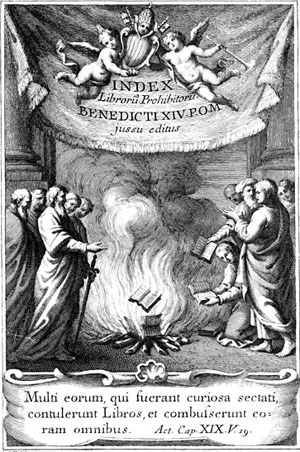  Within
a century of the introduction of printing in Europe a formal
process was required to keep track of books that the Church
had ordered to be destroyed. In 1557 Pope Paul IV established
the Index Librorum Prohibitorum, a list of prohibited
books, usually known simply as the Index. A vast range
of books was put on this Index, scientific, philosophical, religious
and artistic. Jewish books were placed on the Index under Pope
Clement VIII in 1596. Within
a century of the introduction of printing in Europe a formal
process was required to keep track of books that the Church
had ordered to be destroyed. In 1557 Pope Paul IV established
the Index Librorum Prohibitorum, a list of prohibited
books, usually known simply as the Index. A vast range
of books was put on this Index, scientific, philosophical, religious
and artistic. Jewish books were placed on the Index under Pope
Clement VIII in 1596.
The Index was primarily a matter of church law, but in some
countries before the mid-19th century it also had the force
of secular law.
Specific authors whose works have been put on it include most
of the great names of Western literature and learning. Amongst
them have been Galen, Chaucer, Bacon, Erasmus, Milton, Dante,
Montaigne, Rabelais, Copernicus, Galileo, Hobbes, Descartes,
Voltaire, Goldsmith, Locke, Gibbon, Hume, Rousseau, J. S. Mill,
Darwin, and Victor Hugo. Also placed on the Index were writings
that told the truth about the forged documents that the Church
had produced to support papal claims and, more recently, books
about family planning. On the other hand works such as Mein
Kampf have never been prohibited. The Index was abolished
in 1966. Now the Church
has to be content with censoring the writings of its own priests.
Their work is reviewed by censors and given an imprimatur only
if the sentiments conform to the current official line.
On the Index Librorum Prohibitorum
All of Daniel de Foe's works were put on the Index
|
Not on the Index Librorum Prohibitorum
Considered - but not regarded as immoral
|
|
|
|
Uncomfortable public statements by Roman Catholics scholars
continue to be suppressed. For example, in 1985 the Vatican
banned Father Leonardo Boff from making public statements. Some
Roman Catholic countries maintained their own equivalent of
the Index. The Irish Free State, as then was, banned all of
the works of Synge and Yeats, along with other dangerous books
such as Modern Utopia by H. G. Wells, The Origin
of Species by Darwin, and a book about fairies by Arthur
Conan Doyle. In Eire, the successor to the Free State, the Irish
Censorship Board, assisted by the Catholic Truth Society,
continues to uphold the faith. Although now regarded as a figure
of fun in educated circles, its decisions could still cause
offending authors to lose their jobs at the end of the twentieth
century*. Christians in
secular states have often managed to ban respectable works,
again well into the twentieth century: Webster's Dictionary
for example was banned in Arkansas because of its entry on Darwinian
evolution. Information about family planning and birth control
has been banned in many Christian countries.
Over the centuries the Christian Churches have burned countless
thousands, perhaps millions, of books of which it disapproved.
The Protestant record may not be quite as bad as that of Roman
Catholics, but it is not much better. English Parliaments and
juries were keen book burners, and the Public Hangman was kept
occupied burning political and religious "naughty writings"
as well as their naughty authors. The Commons had them burned,
the Lords had them burned, bishops had them burned, judges had
them burned and magistrates had them burned.
|
Detail from The Feast in the House
of Levi (1573), by Paolo Veronese (1528 – 1588).
This painting of the Last Supper was investigated by the
Roman Catholic Inquisition because it included a dwarf,
a dog and a man in German clothes. The inquisitors required
the offenting items to be removed, but Venose escaped
punishment by changing the name of the work, so that the
presence of the dwarf, dog and man dressed in German clothes
ceased to be blashemous*.
In the twentieth century, this incident provided the inspiration
for a Monty Python sketch.
|
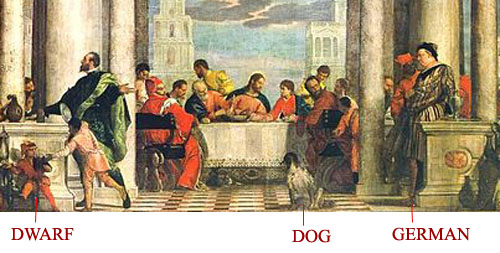 |
Some writers destroyed their own unpublished works, fearing
the consequences of discovery. Thomas Hobbes, who had been lucky
to keep his life after publishing Leviathan in 1651,
is known to have burned some of his papers while under threat.
Even sceptical ecclesiastics were vulnerable. Edmund Gibson,
Bishop of London, destroyed an incriminating manuscript in the
early 1730s. Theologians sometimes published posthumously for
fear of the consequences. The atheist priest Jean Meslier left
manuscripts to be published after his death. Voltaire published
extracts , but Meslier's work was not published in full until
the nineteenth century.
Philosophers were also obliged to publish posthumously or anonymously,
for fear of the consequences. Blaise Pascal published his Lettres
écrites à un provincial secretly and anonymously
in 1656-7 because they exposed Jesuit morality. Spinoza's Theologico-Political
Treatise, which attacked Christian supernaturalism, was
published anonymously in 1670. In France, Denis Diderot had
his rational encyclopaedia suppressed, and he himself was imprisoned
in 1749. The Paris Parliament had burned his Pensées
Philosophiques in 1746 , and he felt obliged to publish
his Pensées sur la Religion anonymously in 1763.
Some of his work, such as Rameau's Nephew and D"Alembert's
Dream, were published only posthumously.
Voltaire had ridiculed conventional Christian ideas in his
novel Candide and other works. His Letters Concerning
the English, published in France as Lettres Philosophiques,
were burned by the public executioner, and an order was made
for his arrest. Fearing Christian retribution from a number
of countries, he lived on an international border, so that he
could escape, whichever authorities proceeded against him. David
Hume worked for 25 years on his Dialogues Concerning Natural
Religion, a critique of the religious Argument from Design.
Because it was likely to be regarded as seditious it could not
be published during his lifetime. It was published, in the teeth
of fierce opposition, three years after his death.
|
Francisco Goya, La maja desnuda
(The Nude Maja) c. 1800.
The painting was never publicly exhibited during Goya's
lifetime as the Catholic Church prohibitted the creation
and display of artistic nudes. The picture was owned by
Manuel de Godoy, the Prime Minister of Spain and a favorite
of the Queen. In 1808 all Godoy's property was seized
by Ferdinand VII.
In 1813 the Inquisition confiscated the work as 'obscene'.
|
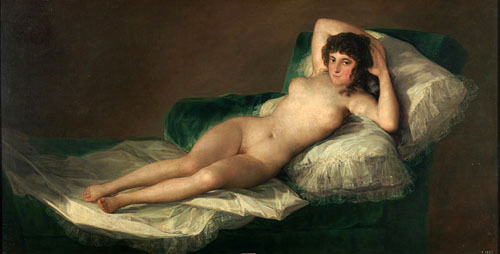 |
|
Francisco Goya, La maja vestida (The Clothed Maja,
c. 1803)
The painting was never publicly exhibited during Goya's
lifetime. It too was owned by Manuel de Godoy, and seized
by King Ferdinand VII. In 1813 the Inquisition also confiscated
this work as obscene.
|
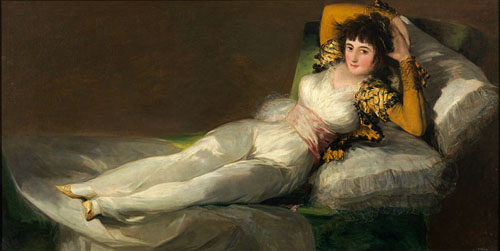 |
It is more than likely that contributions from other philosophers
were suppressed or destroyed by Christian friends and relatives
to avoid posthumous criticism from the God-fearing classes.
All manner of existing works needed tailoring to meet Christian
sensibilities. The devout Dr Thomas Bowdler produced an expurgated
version of Shakespeare's works in 1818. He also bowdlerised
Gibbon's monumental work The Decline and Fall of the Roman
Empire, probably the most thoroughly researched, best-written,
and authoritative history ever produced. He expurgated all the
religious material, judging, perhaps correctly, that Christians
would not wish to learn the truth about the early history of
their faith. In the USA Noah Webster was more considerate still.
He produced an expurgated version of the Bible. It is a mixed
blessing that he could not have done this in England. In England
he would have needed a special licence from Parliament to publish
a translation of the Bible.
Because of contemporary Christian mores, Dr James Murray felt
unable to include a number of ancient English words in the Oxford
English Dictionary, so marring one of the greatest works of
English scholarship ever undertaken. The omissions had to be
rectified in supplements by Dr Robert Burchfield in the twentieth
century. In the USA the position is the same as it was in England.
Webster's Dictionary omitted these words and still omits them.
Even at the end of the twentieth century there was only one
American dictionary that included what publishers call the "big
six" four-letter words*.
Christian sensitivities extend to many areas of life. The Bishop
of Wakefield burned Thomas Hardy's Jude the Obscure
because it did not support the Church's current view of the
sanctity of marriage. Not until well into the twentieth century
was it possible freely to publish works describing abortion
or birth control. In England, the USA and elsewhere, books on
the subject were regarded as pornographic and those involved
in their publication could be, and were, prosecuted under obscenity
legislation. In Roman Catholic countries offending books were
placed on the Index, and sympathetic governments like Hitler's
suppressed them by force*.
In England all conventional media have been controlled at one
time or another. Plays for example were strictly regulated.
By the fourteenth century the only performances permitted in
England were religious ones such as morality plays, miracle
plays and mystery plays. By the sixteenth century the monopoly
had been broken, and to the Church's irritation it was possible
to stage public plays. Theatre censorship was introduced in
1551, but this was not enough. In 1642 Puritans closed the London
theatres altogether. They opened again in 1660 when the Puritans
had fallen from power.
From 1843 the law required new play scripts to be submitted
to the Lord Chamberlain, who would issue a licence for public
performance only if the play was deemed suitable. Many playwrights
had to amend their work in order to get it staged. George Bernard
Shaw had problems with a number of plays, including Mrs
Warren's Profession (1894). Ensuring suitability often
involved sanitising history. For example, a play in 1966 was
denied a licence unless it was amended to include a favourable
view of the papacy's wartime record with respect to the Jews*.
This prior censorship, as it was called, ended two
years later. By then the unfortunate Lord Chamberlain had become
a laughing stock to all but the keenest moralists.
Books had also been subjected to prior censorship (i.e. review
and possible suppression before publication). The first notable
essay arguing "for the liberty of unlicensed printing"
was Areopagitica, published by the Unitarian John Milton
in 1644. His ideas were espoused by the philosopher John Locke.
On Locke's advice Parliament repealed the Licensing Act in 1695,
so ending the practice of prior restraint. It was possible to
push through this repeal largely because the then censor, one
Bohun, had already become a figure of fun — just as the
Lord Chamberlain was to become a figure of fun for the same
reason almost three centuries later. Cinema films have been
subject to prior censorship since 1912 and still are, having
been joined by video films in 1984. For many years the American
film industry was constrained by the US Production Code, the
infamous Hays Code, inspired by God-fearing Christians.
So it was that from 1934 to 1968 cinema storylines had to have
"moral" endings, kisses could not last more than three
seconds , and people were allowed onto a bed only in the most
innocent circumstances. By 1968 the Hays Code had become such
a joke that, like the British Lord Chancellor's role, it had
to be abandoned, despite vocal Christian protestations.
In the late Middle Ages, Christian authorities had been keen
to prevent unauthorised translations of the Bible getting into
the hands of the public. Secret printing was heavily penalised,
but public demand ensured a thriving black market. Printers"
apprenticeships were strictly controlled. Printing was limited
to Oxford, Cambridge and London. Laws were introduced to permit
the search of imports for concealed bibles. But none of it worked,
and bibles became ever more common. Once the bible battle was
over the censors" focus changed to political and religious
sedition; and when that battle was lost too, it changed to sex.
The traditional Christian obsession with sexual matters resulted
in prosecutions for obscenity not only against books about birth
control, but also against respectable literature and even books
on psychology. Amongst the victims of obscenity prosecutions
have been Flaubert's Madam Bovary, Havelock Ellis's
Studies in the Psychology of Sex, James Joyce's Ulysses,
and Norman Haire's Encyclopaedia of Sexual Knowledge.
Christian morality suffered a setback in 1961 when D. H. Lawrence's
last book Lady Chatterley's Lover was published in
paperback. Innocuous as it now seems, it caused outrage at the
time, selling three million copies to top the best seller lists
thanks to the publicity. So too, Hubert Selby's Last Exit
to Brooklyn incurred the wrath of Christians and landed
his British publishers in court, though they won the case on
appeal. In 1968 a play called The Romans in Britain
was prosecuted for obscenity. In 1977 a piece of poetry by Professor
James Kirkup, The Love that Dares to Speak its Name,
was found to be criminally blasphemous*.
Christians still seek to impose their views on others. Because
of Christian sensitivities the film Monty Python's Life
of Brian was banned by some local authorities in Britain
when it was released in 1979. The Independent Broadcasting Authority
also banned it, so that it could not be shown on British commercial
television*. The film's
subject is not explicitly Jesus or Christianity, so it is not
clear why Christians should be so sensitive about it, but in
any case people are being prohibited from seeing a film that
they want to see, both in Britain and in other Christian countries
around the world*. Neither
is this a lone example. In Britain and the USA attempts were
made to ban Martin Scorsese's The Last Temptation of Christ
when it appeared in 1988*.
In 1989 a 20 minute video Visions of Ecstasy was banned
in Britain because it was held to be blasphemous, although it
was based on St Theresa of Ávila's own accounts of her
visions. Eastern Churches have similar attitudes. For example
when Theodore Angelopoulos started shooting The Suspended
Step of the Stork in Greece, a local bishop condemned the
film, inciting violence against the set and crew.
|
Poe's law, named after its author Nathan
Poe, states that without a clear indication of the author's
intent, it is difficult to tell the difference between
an expression of sincere extremism and a parody of extremism
|
|
|
Since it has become impossible for Christians to deny the existence
of atheists, they have taken to denying the possibility of atheist
morality. Many Christians seem to be offended by the idea that
atheists might be capable of leading fulfilled and morally upright
lives. In 1955 the BBC decided to allow rationalists a voice.
Margaret Knight, an eminent psychologist, gave a talk in which
she suggested that people could lead honest and meaningful lives
without the aid of religion. The reaction from Christians was
powerful. Mrs Knight was attacked for immoral and seditious
teachings. Since then, the BBC has never again dared to give
rationalism a fair hearing, preferring a safe diet of religion
produced by its Religious Department. At the time of writing
you can “listen again” to twice as many Radio 4
religious and "ethical" broadcasts as science broadcasts.
No philosophical or genuinely ethical broadcasts are available
at all. Many of the religious and ethical programmes are thinly
disguised religious propaganda but are never identified as such,
and no right of rely is available to those attacked in the course
of these programmes. One such programme, Thought For The
Day, is smuggled every weekday morning at prime time into
the Today programme, the UK's premier morning news
programme. It is never identified as a production of the Religious
Department or even as a separate programme. It annoys the audience
as much as it does the Today broadcasters. Again, the
Today programme used to run a competition each year
to identify the most popular and most unpopular person in the
world — but stopped the latter competition after the Pope
won it two years in a row, eliminating any possibility of him
winning it again. In effect, public opinion has been censored
to protect religious sensitivities.
Even television advertisements are censored because of Christian
sensitivities. Tunes that happen to resemble hymn tunes seem
to cause especial offence. In 1988 Volkswagen had to redub a
television commercial because it had used an Alan Price song,
Changes, the tune of which also features in the song
What a Friend We have in Jesus*.
An advertisement for Quality Street chocolates had to be withdrawn
because its tune sounded like that of the hymn When the
Roll is Called Up Yonder, I"ll Be There*.
Cardinal Basil Hume's office felt compelled to report Tatler
to the Press Council because an advertising feature, based on
a genre of 1950s Italian films, included religious artefacts*.
Christians also routinely complain about television advertisements
for condoms and tampons, which have been permitted on British
television only since the late 1980s. Earlier advertisements
by the Family Planning Association had been removed
from the London Underground because of Roman Catholic sensitivities.
In Britain the police will also step in to enforce religious
compliance and suppress dissent — as for example in April
2005 when football fans were arrested and charged with hate
crimes for declining to join in one minutes" silence for
a recently deceased pope*.
European television has never benefited from the distinctive
brand of Christian morality characterised by the Anglo-Saxon
low churches. Christians in Britain are now concerned at the
quantity of European satellite TV programming now being seen
by British viewers. Similar low-church attitudes are popular
in the USA. In some areas the USA is well ahead in religiously
inspired censorship. Fundamentalists in California have managed
to ban schoolbooks that deal with a wide range of subjects,
including the theory of evolution, race relations, nuclear war,
sex discrimination, human sexuality, birth control and the Holocaust.
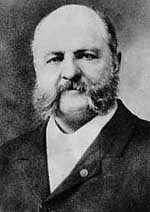  In
the UsA, after the American Civil War Anthony Comstock became
an active worker in the Young Men's Christian Association in
New York City. In 1873, he created the New York Society for
the Suppression of Vice, an institution dedicated to supervising
the morality of the public. Later that year, he induced the
United States Congress to pass the Comstock Law, which made
illegal the delivery or transportation of "obscene, lewd,
or lascivious" material as well as any information concerning
birth control or venereal disease. He was a clever political
operator and had himself made a special agent of the United
States Postal Service, with police powers - including the right
to carry a weapon. With his new powers he prosecuted those he
suspected of the distribution of pornography. In
the UsA, after the American Civil War Anthony Comstock became
an active worker in the Young Men's Christian Association in
New York City. In 1873, he created the New York Society for
the Suppression of Vice, an institution dedicated to supervising
the morality of the public. Later that year, he induced the
United States Congress to pass the Comstock Law, which made
illegal the delivery or transportation of "obscene, lewd,
or lascivious" material as well as any information concerning
birth control or venereal disease. He was a clever political
operator and had himself made a special agent of the United
States Postal Service, with police powers - including the right
to carry a weapon. With his new powers he prosecuted those he
suspected of the distribution of pornography.
  Comstock's
ideas of what might be "obscene, lewd, or lascivious"
were broad. They aroused intense support from church-based groups
worried about public morals and equally intense loathing from
early civil liberties groups. The term "comstockery",
came to mean "censorship because of perceived obscenity
or immorality" Comstock alerted the New York City police
to the content of George Bernard Shaw's play Mrs. Warren's Profession.
As a result of which Shaw remarked that "Comstockery is
the world's standing joke at the expense of the United States.
Europe likes to hear of such things. It confirms the deep-seated
conviction of the Old World that America is a provincial place,
a second-rate country-town civilization after all." Comstock's
ideas of what might be "obscene, lewd, or lascivious"
were broad. They aroused intense support from church-based groups
worried about public morals and equally intense loathing from
early civil liberties groups. The term "comstockery",
came to mean "censorship because of perceived obscenity
or immorality" Comstock alerted the New York City police
to the content of George Bernard Shaw's play Mrs. Warren's Profession.
As a result of which Shaw remarked that "Comstockery is
the world's standing joke at the expense of the United States.
Europe likes to hear of such things. It confirms the deep-seated
conviction of the Old World that America is a provincial place,
a second-rate country-town civilization after all."
Comstock scored a number of notable successes, notably
- Against the men's journal The Days' Doings which had published
popular images of Victoria Woodhull and Tennessee Claflin
which Comstock considered lewd. He also took legal action
against the paper for advertising contraceptives.
- When the sisters Victoria Woodhull and Tennessee Claflin
published an expose of an adulterous affair between Reverend
Henry Ward Beecher and Elizabeth Tilton, he had the sisters
arrested under laws forbidding the use of the postal service
to distribute 'obscene material'.
- He prevented textbooks being sent to medical students by
the United States Postal Service.
- As the self-labeled "weeder in God's garden",
he arrested D. M. Bennett for publishing his "An Open
Letter to Jesus Christ". Bennett was prosecuted, subjected
to a widely publicized trial, and imprisoned. Comstock also
entrapped the editor for mailing a free-love pamphlet.
- Ida Craddock, was found guilty under the Comstock Act for
distributing marriage manuals through the U.S. Mail, but committed
suicide before on the eve of reporting to Federal prison..
Her final work was a suicide note condemning Comstock.
- He was also involved in shutting down the Louisiana Lottery,
which was the only legal lottery in the United States at the
time.
- In 1927 his organisation under John S. Sumner shut down
Mae West's first starring role on Broadway, the play Sex.
West spent ten days in jail as a result.
Inthe first year alone Comstock claimed to have seized 130,000
pounds of books, 194,000 “bad” pictures, 5,500 indecent
playing cards, and 3,150 pills and powders used by abortionists.
Later he boasted that he had been responsible for 4,000 arrests.
He claimed to have driven fifteen persons to suicide in his
"fight for the young". He destroyed 15 tons of books,
284,000 pounds of plates for printing 'objectionable' books,
and nearly 4,000,000 pictures.
|
Saint Anthony Comstock The Village Nuisance
The cartoon lampoons Comstock's interest in unclothed
animals and undressed manequins,
and shows him bathing fully dressed and being burned in
hell by naked demons.
|
|
|
The so-called "Comstock laws" (ch. 258 17 Stat. 598
enacted March 3, 1873) had prohibitted the sending of any matter
through the mails which the Postal Authorities choose to call
"obscene". But the target was not just pornography.
It was any mention of anything that offended Christian sensibilities,
from sex education to irreligious philosophy and birth control.
The laws were used against, for example, book sellers who sent
medical textbooks through the US mail. As Margaret Sanger put
it, the Comstock laws were “designed and enforced to destroy
the liberty of conscience and thought in matters of religion
and against the freedom of the press.” Anthony Comstock
had been Secretary and Special Agent for the Society for the
Suppression of Vice since 1873 and U. S. Post Office Inspector
from the same year. He recorded that he had destroyed 160 tons
of literature and brought 3,760 "criminals" to "justice".
The New York branch of the Society was so proud of its record
of imprisoning people and burning books that it featured scenes
of them on its publicity.
|
John Sumner, President of The Society
for the Suppression of Vice and Martin H.
Meany, New York City Deputy Police Commissioner, supervise
the burning of
forbidden books (1935)
|
|
|
  Matterials
considered "lewd", "indecent", "filthy",
or "obscene" ander The Comstock Law of 1873 (officially
known as the Federal Anti-Obscenity Act) included Aristophanes'
Lysistrata, Chaucer's Canterbury Tales, Boccaccio's
Decameron, Defoe's Moll Flanders, and various
editions of The Arabian Nights. Using Christianity as
its criterion of morality, U.S. Customs In 1930 seized copies
of Voltaire's Candide, claiming obscenity. In 1944, the
US Post Office demanded the omission of the book from a mailed
Concord Books catalog. Matterials
considered "lewd", "indecent", "filthy",
or "obscene" ander The Comstock Law of 1873 (officially
known as the Federal Anti-Obscenity Act) included Aristophanes'
Lysistrata, Chaucer's Canterbury Tales, Boccaccio's
Decameron, Defoe's Moll Flanders, and various
editions of The Arabian Nights. Using Christianity as
its criterion of morality, U.S. Customs In 1930 seized copies
of Voltaire's Candide, claiming obscenity. In 1944, the
US Post Office demanded the omission of the book from a mailed
Concord Books catalog.
The Comstock laws, now largely unenforced, remain for the most
part on the books today; the Telecommunications Reform Bill
of 1996 even specifically applied some of them to computer networks.
The Comstock law also forbade distribution of birth control
information. In 1915, Margaret Sanger's husband was jailed for
distributing her Family Limitation, which described and advocated
various methods of contraception. Sanger herself had fled the
country to avoid prosecution.
Comstock fought his last battle in San Francisco, while attending
the International Purity Congress. He initiated a prosecution
against a San Francisco department store for dressing nude mannequins
in the store window in public view. He lost the case and never
recovered from the ridicule that it generated. He died in 1915.
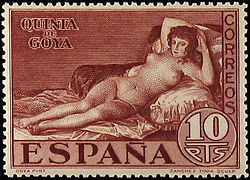  Because
of its history, book burning is generally regarded with horror
in the West. But many Christians still regard it as acceptable.
After the Scopes trial in 1925, a Christian High School superintendent
in Meridan, Mississippi, organised a public bonfire of pages
torn from textbooks dealing with evolution. Following public
burning of Salman Rushdie's book The Satanic Verses
in the 1980s, an Iranian fatwah was issued calling for the killing
of the author. All secular opinion concurred that this was intolerable.
The only influential Western voices raised against Rushdie and
in favour of censorship came from the Christian Churches. Because
of its history, book burning is generally regarded with horror
in the West. But many Christians still regard it as acceptable.
After the Scopes trial in 1925, a Christian High School superintendent
in Meridan, Mississippi, organised a public bonfire of pages
torn from textbooks dealing with evolution. Following public
burning of Salman Rushdie's book The Satanic Verses
in the 1980s, an Iranian fatwah was issued calling for the killing
of the author. All secular opinion concurred that this was intolerable.
The only influential Western voices raised against Rushdie and
in favour of censorship came from the Christian Churches.
On the Index Librorum Prohibitorum
Les Miserables by Victor Hugo
|
Not on the Index Librorum
Prohibitorum
Books on Guns, mines, weaponry and killing
Not considered immoral
|
|
|
|
|
|
|
|
On the Index Librorum Prohibitorum
The most famous French dictionary
|
Not on the Index Librorum Prohibitorum
Ant-semitic propaganda
Not considered immoral
|
|
|
|
|
|
|
|
On the Index Librorum Prohibitorum
The most famous of all - Galileo's book on the solar system
|
Not on the Index Librorum Prohibitorum
Books justifying torture and judicial murder - considered
highly moral and issued under papal authority
|
|
|
|
|
|
|
|
On the Index Librorum Prohibitorum
any book that like this one mentioned contraception, even
for married couples
|
Not on the Index Librorum Prohibitorum
Support for capital punishment, mutilation, torture and
corporal punishment - all considered moral
|
|
|
|
|
|
|
|
On the Index Librorum Prohibitorum
The most famous French Enlightenment Dictionary
|
Not on the Index Librorum Prohibitorum
Racists tracts like this one - never considered immoral
by the Church for the centuries when the Index operated
|
|
|
|
|
|
|
|
On the Index Librorum Prohibitorum
All translations of the bible not authorised by the Roman
Catholic Church
|
Not on the Index Librorum Prohibitorum
works onwarfare
Warfare not considered immoral
|
|
|
|
| |
|
|
|
|
|
On theIndex Librorum Prohibitorum
Voltaire's history of the Crusades
|
Not on the Index Librorum Prohibitorum
Works advocating slavery
Not considered immoral
|
|
|
|
|
|
|
|
On theIndex Librorum Prohibitorum
Favourite French stories
|
Not on the Index Librorum Prohibitorum
Books advocating wife beating and sexist nonsense
Not considered immoral
|
|
|
|
|
|
|
|
On the Index Librorum Prohibitorum
Casanova's Memoires
|
Not on the Index Librorum Prohibitorum
Bogus and fraudulent stories about the supernatural
Not considered immoral
|
|
|
|
|
|
|
|
On theIndex Librorum Prohibitorum
Edward Gibbon - the leading historian of the English speaking
world
|
Not on the Index Librorum Prohibitorum
Lies and misinformation about natural history
Not considered immoral
|
|
|
|
|
|
|
|
On the Index Librorum Prohibitorum
All of the works of Alexandre Dumas (pere) containing
love stories
|
Not on the Index Librorum Prohibitorum
Murderous sadistic fantasy
Not considered immoral
|
|
|
|
|
|
|
|
On the Index Librorum Prohibitorum
All of the works of Alexandre Dumas (fils) containing
love stories
|
Not on the Index Librorum Prohibitorum
Deranged religious fantasies
Not considered immoral
|
|
|
|
|
|
|
|
On the Index Librorum Prohibitorum
The holy books of faiths other than Roman Catholicism
|
Not on the Index Librorum Prohibitorum
Discredited and dangerous Nonsense
Not considered immoral
|
|
|
|
|
|
|
|
On theIndex Librorum Prohibitorum
Works by almost all of the most influential western philosophers
of all time
|
Not on the Index Librorum Prohibitorum
Books in favour of killing
Not considered immoral
|
|
|
|
|
|
|
Further Reading
Comstock
Beisel, Nicola Kay. Imperiled innocents: Anthony Comstock
and family reproduction in Victorian America. Princeton, N.J.:
Princeton University Press, 1997.
Miller, Neil. Banned in Boston: the Watch and Ward Society's
crusade against books, burlesque, and the social evil. Boston:
Beacon Press, 2010.
Sante, Luc. Low life: lures and snares of old New York.
New York: Farrar Straus Giroux, 1991.
|
|
|
|
|
|
|
|
|
|
|
|
|
|
|
|
|
|
|
|
|
|
|
|
|
|
|
|
|
|
|
|
|
|
|
|
|
|
Buy the Book from Amazon.com
|
|
|
|
|
|
Buy the Book from Amazon.co.uk
|
|
|
| |
| |
| More Books |
|
|
|